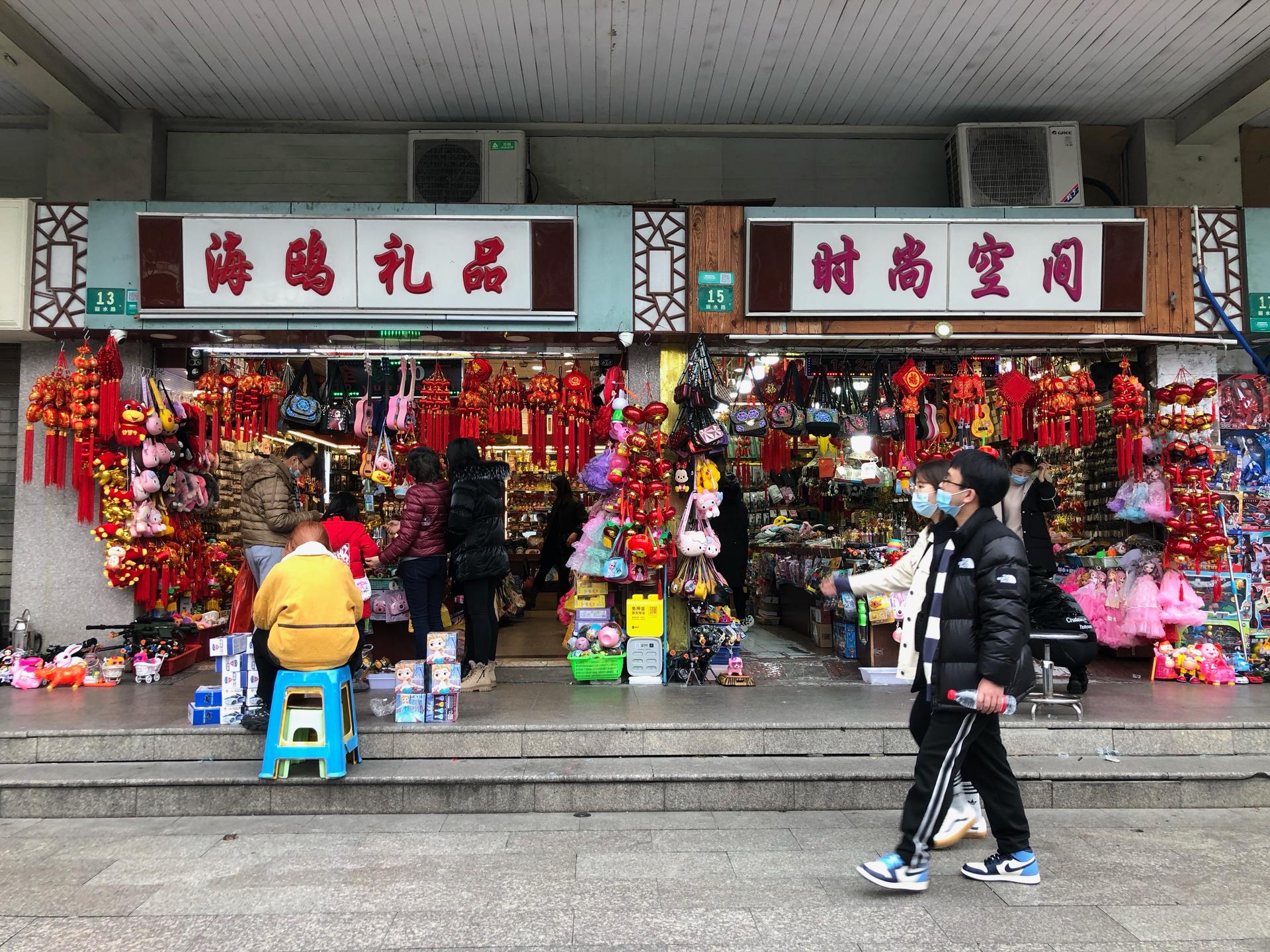At Yu Gardens, a popular Shanghai tourist spot, visitors are doing a bit of Chinese New Year shopping and taking in the sights.
Even with face masks, health codes and temperature checks, the atmosphere here is festive, with red lanterns, red door posters — red everything.
Huang Yun, who sells New Year’s decorations at an open-air market here, says it’s nowhere near as crowded as in years past.
“In a normal year, you’d really have to push to get through the crowds. I think tourists are down by two-thirds this year.”
“In a normal year, you’d really have to push to get through the crowds,” she said. “I think tourists are down by two-thirds this year.”
Related: Wary of coronavirus vaccines, some Chinese citizens are ‘opting out’
Although China has been successful at curbing COVID-19 — locking down cities, building quarantine centers, disinfecting streets and conducting mass testing, and has reported fewer than 5,000 deaths from the virus — few are taking chances this holiday season.
Chinese New Year fell on Feb. 12 this year, and the country’s 40-day holiday travel season is considered the largest human migration in the world. But this year, travel is down by half as millions of people decided to celebrate the holiday in place. The government hasn’t actually forbidden travel this year, but they’re strongly discouraging it.
Zhang Ke said he and his colleagues decided to play it safe.
Usually, he would be heading home to see his family in Shanxi province at this time of year.
“I wanted to go, but because of the ongoing pandemic, we’ve been told to stay in Shanghai,” he said. “So, I’ll keep working; the pay is double.”
Related: One year after lockdown, Wuhan volunteers say the pandemic transformed their lives
Traveling home to be with family during the holiday is the one time many people here get to see their children or elderly family members. Many schools and workplaces have suggested people not travel unless necessary. Some cities even offered small financial incentives to stay put.
“We decided not to go because we didn’t want to trouble our families. We’d have to do a COVID-19 test and quarantine; it just seemed too much of a bother.”
“We decided not to go because we didn’t want to trouble our families,” he said. “We’d have to do a COVID-19 test and quarantine; it just seemed too much of a bother.”
People are still finding ways to celebrate, though — with video calls to family members, feasts with nearby friends and sending cash gifts by phone.

Tracy Dai works at China Skinny, a Shanghai marketing research firm. She says advertisers switched up their ad campaigns, too.
“A lot of brands are really taking Chinese New Year and homesickness for the marketing of their brands,” she said.
Instead of showing the usual teary family reunions, the theme this year is being apart.
Related: Wuhan — China’s punk capital — slowly returns to its indie music scene
Dai also chose not to travel this year, although her home village is just three hours away by high-speed train. This is her first time spending the holiday without her family. She says that the risk of the virus is partly just an excuse.
“I’m already in my 30s and I haven’t been married yet,” she said. “Every single time when you go back my mom was fine, but like, my grandparents they were just pushing me so much.”
She’s celebrating this year with friends, sharing foods from their hometowns, drinking and playing board games. Most are single like her.
But she said memories from last year’s lockdown and the rise in COVID-19 cases in places like Shanghai and Hebei in the past month are also playing into people’s decision not to travel.
“We were worried about, ‘Oh, if I travel back home right now, what happens if things get worse?’ I get locked down in my own hometown and I can’t get back to the city to work. So, that’s one of the little concerns as well.”
“We were worried about, ‘Oh, if I travel back home right now, what happens if things get worse?’ I get locked down in my own hometown and I can’t get back to the city to work. So, that’s one of the little concerns as well.”
Still, some people are cautiously venturing out.
Related: Revisiting Wuhan a year after the coronavirus hit the city
Yashu Zhang and her mother debated canceling their plans to take a 16-hour trip to their home village in Hunan province but in the end, they decided to go.
“I was a little bit concerned with how the people in my mom’s hometown would think about this.”
Her relatives told her that even though both Shanghai and Hunan are considered low-risk areas, the local government was warning it might require a 14-day quarantine and COVID-19 tests every seven days. Once they arrived though, things were not as strict.
“We just went to the local neighborhood residential committee. We went to register, put down our names, show our test report and that was it. No one told us, ‘Don’t walk around, don’t visit your relatives.’ There was nothing like that.”
Zhang says that people’s decision to travel or not was less about the risk of COVID-19 than it was about unpredictable policies made by local governments terrified of an outbreak.
“There’s nothing too specified or very clear, so everybody is trying to understand the real policy.”
Our coverage reaches millions each week, but only a small fraction of listeners contribute to sustain our program. We still need 224 more people to donate $100 or $10/monthly to unlock our $67,000 match. Will you help us get there today?
